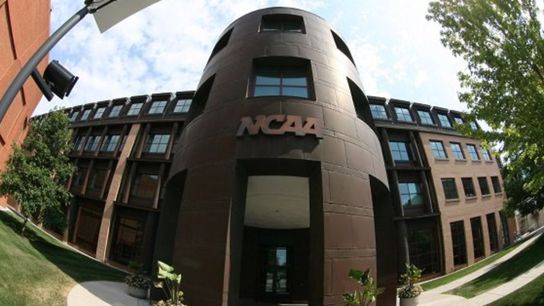The NCAA's legislative process continues inching forward, and the latest inch came Friday when the Division I Council offered its full name, image and likeness proposal to membership.
What does this mean? The NCAA's top legislative body, the Division I Council, formally proposed legislation that would allow college athletes to make money for being college athletes. Whatever does or doesn't come of this, this is still a landmark moment in NCAA history.
How could they make money? Athletes could run businesses related to their status as athletes -- autograph signings, conducting clinics or lessons -- or independent of their status as athletes. Alabama wide receiver DeVonta Smith, for example, could hold his own wide receiver camp, or he could open an Etsy shop selling artisan, hand-woven coasters and he could do so as Alabama wide receiver DeVonta Smith, not DeVonta Smith who happens to play wide receiver for Alabama. More practically, athletes are permitted to own monetized YouTube channels or accept payment for producing sponsored Instagram content.
Can college athletes have agents now? Yes. Athletes must pay their agents standard market fee and disclose the arrangement to the NCAA.
Are boosters allowed to arrange payments for recruits? No.
How is the NCAA going to stop that? Your guess is as good as mine.
Any other red tape we need to know about? The NCAA will appoint a third-party administrator for which athletes must disclose any NIL deals. Also, athletes can't endorse, promote or sell products that are in conflict with their school's sponsors. For instance, Smith couldn't start repping Adidas or Under Armour, since Alabama is a Nike school. Schools also wouldn't be allowed to directly arrange deals for players, but several schools are already working around that. Athletes also can't use school logos or marks in NIL appearances.
Finally, athletes are not allowed to sell official team gear -- bowl rings, apparel -- until their eligibility is exhausted.
Isn't this in direct conflict with several state laws? Yes, California and Florida, to name two.
How is the NCAA going to deal with that? They can't overrule state law, can they? That's why the NCAA is asking for Congressional help.
Anything about the video game?? Group licensing was not addressed, meaning the video game will have to wait.
When would it begin? Aug. 1, 2021.
So it's final then? Haha, no. The proposal will now go to membership, who have until Dec. 15 to suggest changes. It won't become finally final until the NCAA convention in January.
